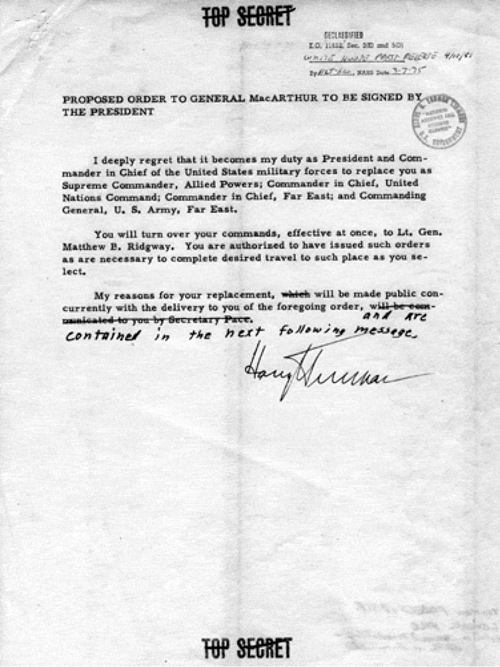If the Communist authorities realize that they cannot defeat us in Korea, if they realize it would beInteractive popup. Assistance may be required.
foolhardy
to widen the hostilities beyond Korea, then they may recognize the folly of continuing their aggression. A peaceful settlement may then be possible. The door is always open...
I have thought long and hard about this question of extending the war in Asia. I have discussed it many times with the ablest military advisers in the country. I believe with all my heart that the course we are following is the best course.
I believe that we must try to limit war to Korea for these vital reasons: to make sure that the precious lives of our fighting men are not wasted; to see that the security of our country and the free world is not needlessly jeopardized; and to prevent a third world war.
President Truman, April 11, 1951
|
There are those who for varying reason would appease Red China. They are blind to history's clear lesson, for history teaches with unmistakable emphasis thatInteractive popup. Assistance may be required.
appeasement
but Interactive popup. Assistance may be required.
begets
new and bloodier wars...Like blackmail, it lays the basis for new and successively greater demands until as in blackmail, violence becomes the only other alternative. Why, my soldiers asked me, surrender military advantages to an enemy in the field? I could not answer...
I have just left your fighting sons in Korea. They have met all tests there, and I can report to you without reservation that they are splendid in every way.
It was my constant effort to preserve them and end this savage conflict honorably and with least loss of time and a minimum sacrifice of life.
General MacArthur's Address to Congress, April 19, 1951
|
Activity: (Answer in your notes.)
- When Truman says "The door is always open. . ." what does he mean?
- After reading the excerpt, what do you think Truman was trying to prevent?
|
Activity: (Answer in your notes.)
This speech by Douglas MacArthur is known for its famous conclusion that "Old soldiers never die, they just fade away." However, in the excerpt above, the general explains his efforts in Korea.
- What does MacArthur mean by appeasement with Red China?
- How does MacArthur explain his efforts in Korea?
|

 Source: Proposed order to General MacArthur to be signed by The President, Harry S. Truman Library & Museum.
Source: Proposed order to General MacArthur to be signed by The President, Harry S. Truman Library & Museum.
![]() Watch MacArthur deliver this speech on the video below.
Watch MacArthur deliver this speech on the video below.